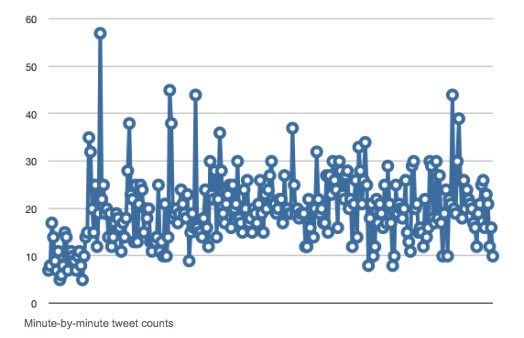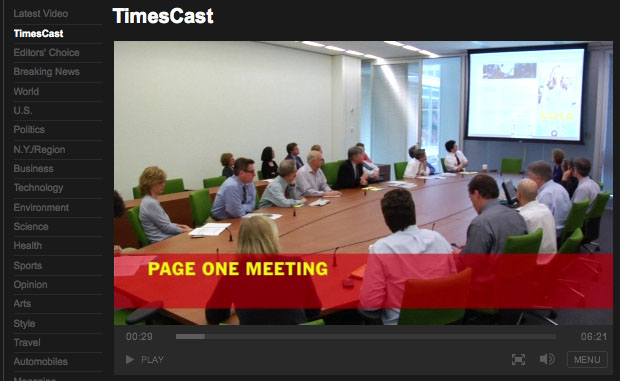According to the Wall Street Journal, its local rival the New York Times will begin charging for online content in January 2011. The announcement was made by Bill Keller, executive editor of the newspaper, at a dinner for the Foreign Press Association last night.
Tag Archives: New York Times
Wired: New York print war is really about digital future
There has been plenty of excited coverage of the playground spat between the Wall Street Journal and the New York Times started by the Journal’s move into general interest metro coverage. The Journal’s news section, Greater New York, launched yesterday, and the Times war committee responded quickly with a memo to subscribers reminding them just how great the paper’s New York section is, and has been for so much longer than the Journal’s johnny-come-lately.
So far the whole thing seems, unsurprisingly, to have revolved about print, but Wired’s Eliot Van Buskirk claims the war is “really about digital”.
The spat appears to be about local New York coverage, but really, it’s about both organizations’ digital future (…) By cutting ad rates and suddenly going after the same non-financial local stories as the Times, Murdoch is waging a good, old-fashioned newspaper war in the traditional sense. But the spoils this time will be the hearts and minds of a digital audience faced with far more choices than consumers of print.
NYTimes.com: New York Times reports profit; will charge from January
A few takeaway points from the New York Times Company’s results yesterday:
- A net income for Q1 of $12.8 million;
- Introduction of the planned metered-pay system in January 2011;
- Launch of paid-for iPad application in January too.
Howard Kurtz: The media benefiting from non-profit investigations
Washington Post’s Howard Kurtz provides some more background on the New York Times / ProPublica Pulitzer win, as an example of a new way of funding serious journalism.
This is a glimpse of an unexpected future: a battered newspaper business, an idealistic start-up with a deep-pocketed liberal backer, and dogged reporters who otherwise might be out of work. If the Times was piggybacking on ProPublica – which covered about half the $400,000 cost of the investigation – the paper has plenty of company.
A New York Times link shared every four seconds on Twitter
That’s according to a post from Jacob Harris on Open, NYTimes.com’s developers’ blog. Harris explains the process behind counting the number of links shared – including how shortened URLs are dealt with – when taking a few hours’ worth of tweets from a Monday afternoon.
The data ranged from a minimum of 4 to a maximum of 57 (that is, from once every 15 seconds to almost once a second), as the following chart of minute-by-minute counts demonstrates.
NYT: News sites reconsider allowing anonymous comments
New York Times technology reporter Richard Pérez-Peña examines the problem of anonymous comments being widely permitted on news sites. With the Huffington Post and the Wall Street Journal announcing plans to revise their comment systems, will other mainstream news organisations begin to reconsider this well-established policy?
No one doubts that there is a legitimate value in letting people express opinions that may get them in trouble at work, or may even offend their neighbours, without having to give their names, said William Grueskin, dean of academic affairs at Columbia’s journalism school.
“But a lot of comment boards turn into the equivalent of a bar room brawl, with most of the participants having blood-alcohol levels of 0.10 or higher,” he said. “People who might have something useful to say are less willing to participate in boards where the tomatoes are being thrown.”
New York Magazine: Weigh-in for New York Times and Wall Street Journal
The launch of the Wall Street Journal’s New York edition is just around the corner, and Rupert Murdoch is going after the Grey Lady as tenaciously as his massive advertising cuts suggest. But as the playground rivalry heats up and first blows are traded, New York magazine highlights just how much more of a heavyweight contender the Times is in terms of personnel:
Here’s a list of the reporters we know will be devoted, at least part-time, to working on the Journal‘s new New York section. After each, we’ve listed the reporters that cover the same beat for the Times. As you can see, in nearly every beat, the Times already has two reporters in place for each one of the Journal‘s.
The magazine’s full comparative list must make intimidating reading for the Journal reporters heading into the ring, but, as Greenslade points out in his post, the NY Times Company has no way near the resources of News Corp, and the Journal’s New York edition could expand significantly yet.
FishbowlNY: Atlantic Media announces 2010 Michael Kelly Award finalists
Atlantic Media today announced the finalists for the 2010 Michael Kelly Award. The award recognises fearless journalism in the pursuit of truth.
The finalists are:
Ken Bensinger and Ralph Vartabedian, Los Angeles Times
For their coverage of malfunctioning cars produced and recalled by Toyota.
Sheri Fink, ProPublica
For her coverage of medical treatment in the wake of Hurricane Katrina
Jeffrey Gettleman, the New York Times
For his coverage of pirates in Somalia, the of spread of Islamic radicalism, and mass rape in eastern Congo.
David Rohde, the New York Times
For his coverage of his own kidnap and seven-month imprisonment by the Taliban, and his eventual escape.
Michael Kelly, a former editor of the Atlantic and the National Journal was killed while reporting from Iraq in 2003.
Random Guardian and New York Times – a ‘chatroulette for news’
While I might not entirely understand the growing popularity of Chatroulette, a video chat site where users can change to a new, random partner at the click of a button, it’s interesting to see the Guardian’s and New York Times’ own take on a ‘chatroulette for news’.
The Random Guardian will throw up a random page from the past 24 hours from Guardian.co.uk, which can be changed by clicking ‘play again’.
Daniel Vydra, a software developer at the Guardian, has created the same randomiser for the New York Times too, pulling in the Times Newswire API.
It’s mainly a bit of fun, but following on from our post on Ultraknowledge and new ways to search and navigate news sites, the applications bring a note of serendipity and gaming to your average browsing experience.
New York Times launches behind-the-scenes video feature
The New York Times has launched a new daily video feature on NYTimes.com.
TimesCast, which is available on the newspaper’s homepage between 1:00pm and 2:00pm EST Monday to Friday, falls somewhere between an ordinary television news broadcast and a short behind-the-scenes documentary. Viewers see segments of the daily page one meeting, followed by various reporters and editors in conversation about stories they are working on.
Previous days’ episodes will be available via the Times’ online video section.
Follow this link to see the first TimesCast episode in full.
“This is another example of our continuing emphasis on video, which represents one of the largest growth areas in digital media,” said Denise Warren, senior vice president and chief advertising officer, The New York Times Media Group and general manager, NYTimes.com.
Last December the Times launched TimesSkimmer, a new format for organising online content that allows users greater control over layout.

